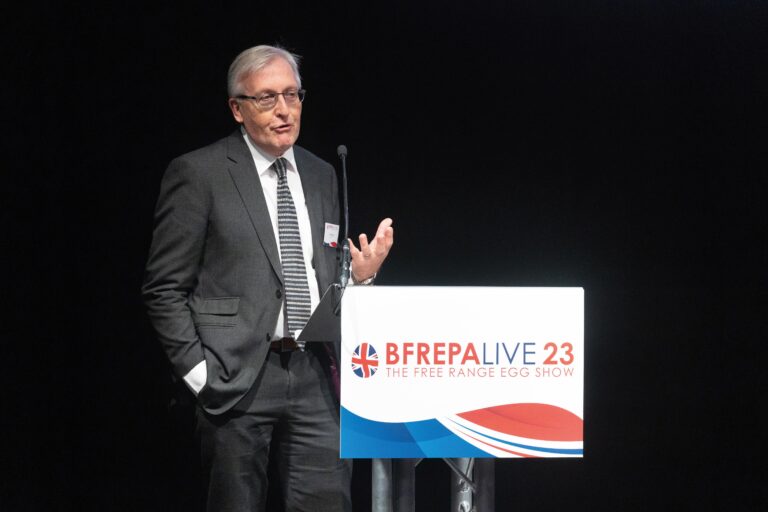Producers are in favour. But it’s not that simple.
Should free range egg producers vaccinate against avian influenza (AI)? The pros and cons were debated on stage at BFREPA Live, held at Telford International Centre in November. Robert Gooch, chief executive of the British Free Range Egg Producers Association (BFREPA) was joined by Gordon Hickman, head of exotic disease control at Defra and Ian Lowery, partner at Crowshall Veterinary Services.
At the start of the discussion, a packed audience made up of egg producers was asked to indicate if they wanted to vaccinate their flocks. Hands shot up around the room and Gooch estimated from the podium that 90% of producers were in favour.
Currently, 14 countries around the world have begun vaccinating against AI. China was one of the first, with its decision driven by a number of cases in people. Reasons for vaccinating are different elsewhere, with France, the most recent country to start a programme, keen to protect its valuable duck industry.
Hickman told delegates vaccination in the UK is not currently allowed, but there was no legislative barrier preventing it and a licence could be issued if Defra became convinced it were the right way forwards.
There were two ways vaccination could be used, said Hickman. Emergency vaccination could be introduced, and that would involve government officials co-ordinating where and when vaccines were administered.
Preventative vaccination was the other option, which Hickman described as “longer term but not necessarily a permanent strategy”.
Application
There were various vaccines in use around the world, said Hickman. The ideal vaccine for the UK market would be a single dose applied in the hatchery or to day old chicks. “It would be important that it was inexpensive and usable in multiple avian species,” he added.
However, the cost of administering the vaccine was not the primary consideration. Trading partners including the EU have very stringent requirements when dealing with countries that vaccinate against AI. These include ensuring vaccinated flocks have a monthly visit from a vet, and samples taken from every vaccinated flock each month which must then be tested at official government labs. This is to ensure infection is not silently circulating among vaccinated flocks, increasing the risk of the disease spreading more widely.
The costs and logistics of these requirements presented the biggest barrier by far, said Hickman.
He said that while Defra does support vaccination provided it is properly managed and provided trading partners agree it is the right thing to do, the take home message was one of good biosecurity. He added that “we are in a slightly quieter position this year” with outbreaks, which may give industry and government more time to think about the right approach.
Who benefits?
Ian Lowery, a partner Crowshall, concurred that the cost of vaccination was unlikely to be prohibitive, but the costs of mandatory surveillance, including monthly visits from vets and the taking of swabs that have to be tested at government approved facilities, would be huge.
He said rough estimates for the samples taken by vets would amount to £1,000 – £1,500 per poultry house per month.
“Where does the benefit come?” said Lowery. “Does the state benefit, because it has to pay fewer compensation payments, or do producers benefit?”
He said were the virus to become transmissible to humans, the cost benefit analysis would rapidly shift in favour of vaccination, as it has done in other countries, such as China.
International trade was a key consideration. While it was not directly an issue to free range egg producers, whose product is sold almost exclusively in the UK, other parts of the poultry industry would be disadvantaged by further trade barriers introduced if Britian were to start vaccinating. “We send meat and chicks around the world. We are not going to see a significant vaccine programme without trade issues being addressed,” said Lowery.
Politically difficult
The message given to other nations if we were to vaccinate was “politically difficult”, added Hickman. Countries that do not vaccinate communicate to other markets that while they may have episodes of AI, they are essentially free of the disease. Those who do opt to vaccinate are “essentially telling trading partners ‘we can’t manage flu and we need to vaccinate’.
Other countries that vaccinate have endemic disease in the poultry population. “In the UK, it is still an exotic disease and we want to eradicate this disease. Once you start vaccinating, you are in it for a long time.”
Hickman added that “we could stomach that, maybe for turkeys”, but the industry needed to be aware of the trade-offs and the huge financial cost.
At the end of the session, Gooch asked again for a show of hands among producers who were in favour of vaccination. Nobody raised their hand.


